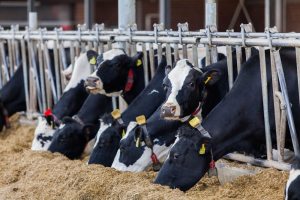A team of researchers has detailed the value that by-products provide when used in California dairy feed. The report, “By-Product Use in California Dairy Feed Has Vital Sustainability Implications,” highlights the relationship between dairy farmers and other crop producers. Researchers from UC Davis and UC Cooperative Extension note that the practice of upcycling ag by-products has a significant impact on sustainability. The research was published in the Nov/Dec 2020 edition of ARE Update.
There are more than 1.7 million dairy cows in California that produce approximately $7 billion in value. The authors note that feed rations account for more than half of the cost of milk production. As dairy production grew over the past 30 years, California’s production of alfalfa declined by 50 percent in the last 12 years. At the same time, almond acreage has nearly tripled in the last three decades. The dairy sector has become a key market for the increasing number of hulls the have resulted from a rise in almond production. Approximately 95 percent of almond hulls from California trees are used as dairy feed.
More than 70 agricultural by-products can be used as dairy feed, with almond hulls, canola meal, cottonseed, and distillers’ grains being the most popular. In a 2019 survey conducted by the authors, 95 percent of respondents from the San Joaquin Valley used ag by-products in their rations. Approximately 90 percent of cows in California are located in the Central Valley. Agricultural by-products account for 35 percent of feed costs on average, and roughly 35 percent of total dry matter fed.
The authors of the report detail the negative impact that would be felt if by-products were no longer a part of California dairy feed. Average ration costs would increase by 20 percent, resulting in a 10 percent increase in production costs. A lack of by-products would increase demand for other feed sources such as alfalfa, in-turn requiring more water for production. Without an outlet such as dairy farms, maybe ag by-products would end up decomposing in landfills and generating carbon dioxide.











